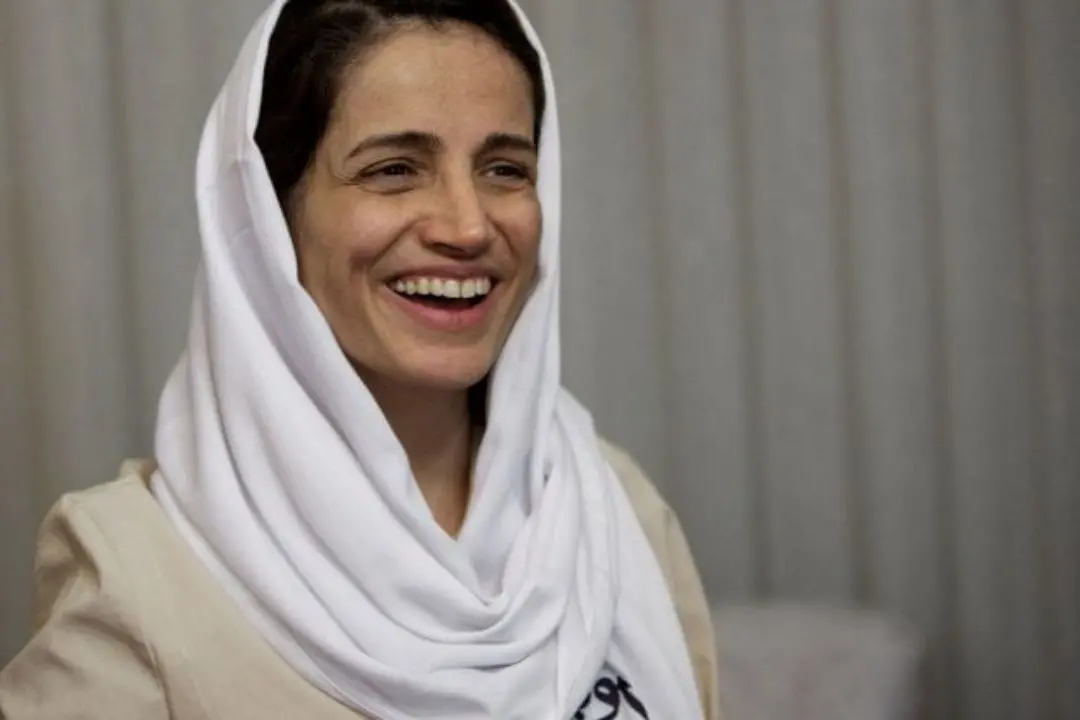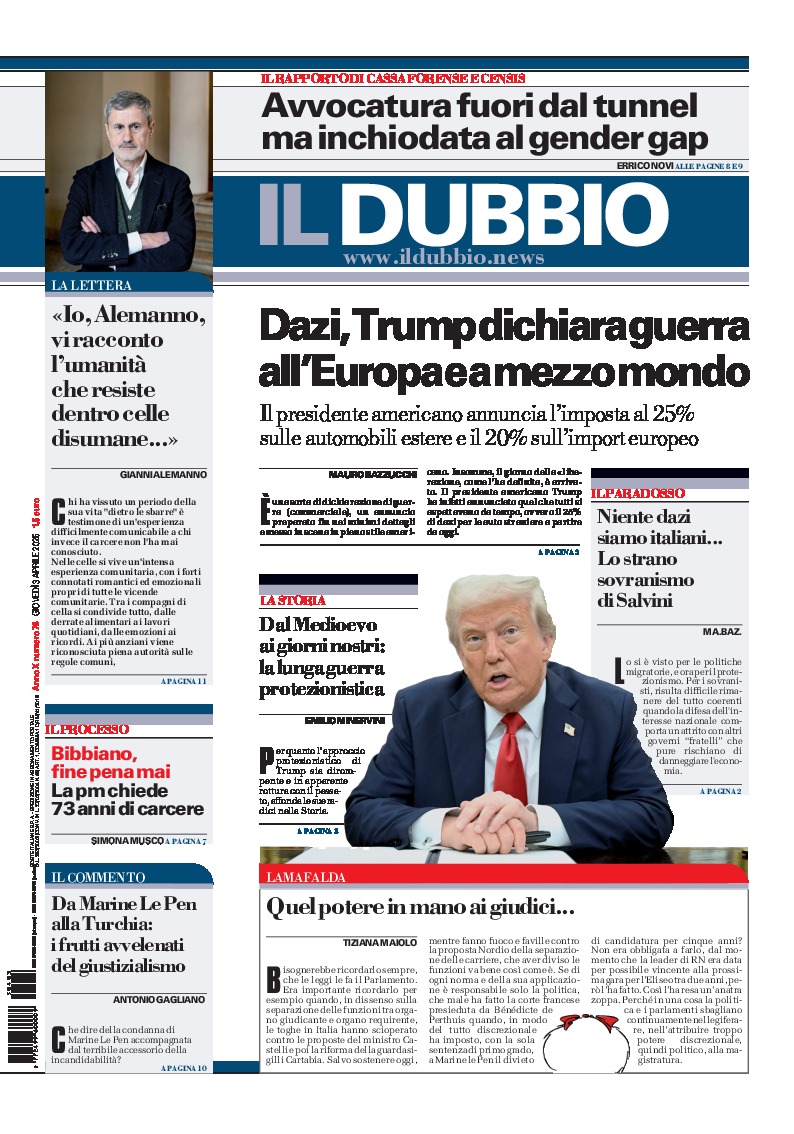PHOTO
Nasrin Sotoudeh
Nasrin Sotoudeh is not afraid to speak out, even if her fate, following an unjust sentence handed down by the Iranian regime, is to go back to prison. Where waiting for her, as well as a sentence of 38 years in prison, there are also 148 lashes, the price to pay for having defended, as a lawyer, the street girls of the revolution, who protested against the hijab. Accused of «subversive propaganda» and of «encouraging corruption and debauchery», the activist was convicted during a trial without contradiction, which she decided not to contest: «I didn't want my participation in the court and the my legal challenges to the sentences issued, with absurd accusations, created the perception that the judges of these courts considered themselves legitimate», she told us.
You have been on medical leave for some time, after spending time in prison following an unjust conviction. What is your state of health right now?
At the moment, my physical health is not bad. In truth, the 16 months that I have been out of prison has helped my recovery. But seeing these conditions in my country is unbearable for me. Condition, that as you see, lead to the death of our youth for something as truly insignificant as the veil, and then to see them killed again and thrown in prison for supporting each other, which is a natural and human impulse. The wheel of violence does not cease turning, since the many vacuums in international law permit governments to turn a blind eye on violations of human rights in all corners of the world and to permit a government to continue its blatant violations of human rights with impunity. This permission which is often accompanied by the silence or neglect of the actions of such a governments, but what makes the nightmare that comes crashing down harder on citizens is when governments permit violators of human rights investment opportunities that turn into their paradise. Truly, is it not time for politicians to be a bit more sincere with their people? Do you think you can extend your leave of absence from prison for health reasons? Truly, concerning the extension of my furlough, I don’t know if it will be approved or not. But, at any rate, over the past months, my furlough has been repeatedly extended and my condition, compared to last year, has not changed. But naturally all the medical recommendations and decisions related to the extension of my furlough are influenced by security issues that are hard to anticipate.
What situation did you find in prisons?
In the last twelve years, due to my decision to represent those accused of political crimes as well as the “Girls of Revolution Street” (protesting the compulsory hijab), I was in prison for a total of 6 years, 5 of which I spent in Evin prison and one in Qarchak prison. In both prisons, the conditions were inhuman. The atmosphere in Evin prison is high security, which is a truly suffocating environment for prisoners. The interrogators could come into the women’s ward at will, summon the prisoners to the ward office, and speak to prisoners in a menacing tone. Prisoners would often meet with the interrogators hoping to find a way to be released.
Were you subjected to violence during your incarceration?
I experienced violence many times in prison. When I refused to participate in the show trials of the revolutionary courts, they dragged me into court with physical violence. When I refused to wear the veil for visits with my children and wore the prison issued clothing, they would cut my visits with my young children. When they would arrest my daughter, or freeze my husband and my bank accounts, or would bar my daughter from traveling outside the country, and just a litany of injury and assault, all had the characteristics of torture.
Do you think that telling what is happening will come back to bite you when you return to prison?
Naturally, when I return to prison I will face such forms of violence. At any rate, because of the non-renewal of my license to practice law, I cannot defend protesters in Iran, a fact that pains me. My greatest concern is the issuance of death sentences to protesters in a manner that is illegal and designed to cause fear. Where ever I may be, my main priority is to prevent the issuance and enforcement of death sentences.
Why did you decide not to challenge the unjust sentence by which you were sentenced to an absurd and violent punishment?
The reason I did not want to protest my sentence, which at that time was a total of 38 years in prison and 148 lashes was familiarity with the operations of the court and the utter disregard of revolutionary judges. I did not want my participation in the court and my legal challenges to the issued sentences, with preposterous accusations, to create the perception for the judges in these courts to think of themselves as legitimate. I wanted to cry, as loud as I could for my voice to be heard by everyone, and expose the revolutionary courts and their sworn judges who would do anything at any price to protect the system. Naturally, as a lawyer representing political prisoners before the revolutionary courts I could not use such an approach, these are approaches that the accused themselves had to choose. But for myself, this was how I decided to proceed.
What will happen in the future? Do you think you can be released despite heavy charges and an unacceptable verdict?
Considering that the political system in Iran is a dictatorship, and since Iran’s judiciary is not independent, and because no one acts according to the law, it is hard for me to predict what will happen with my case. But I do know one thing and that is that the world has changed thanks to civil disobedience and that such resistance by others before us has shown us that these methods and work, so there is no reason for it not to serve our purpose. I have chosen a path that I believe is correct and so before I think about how the government might react to my case, I think about what it is that I must do.
How important is your role as a lawyer and woman in your battle for rights?
Of course, you know that there have been other women jurists and lawyers who have devoted themselves to actualizing justice and women’s rights, among them Shireen Ebadi and Mehrangiz Kar, both of whom were forced into exile. Now it is my turn. I think the most important consequence of the presence of women in specialized professions such as sociology, law, economics, medicine and other fields, really more than anything else, is doing away with the fantasy that a woman is worth half a man. The efforts of all jurists, whether female or male, is focused on equal rights, regardless of sex, race, ethnicity and language. Actualizing these values requires a healthy judicial system with independent lawyers and neutral judges. I believe some lawyers have been able to honor their role as independent lawyers and not surrender before fear and threats. But in all these years, our efforts to establish a healthy and neutral judicial system have not had the desired result.In what situation do lawyers work in Iran?Lawyers in Iran face many dangers, dangers that often lead to their arrest. In the recent protests, the instant lawyers step forward to represent a client, they are arrested along with their client.
A battle for rights is underway in Iran: are there any differences with the battles of the past?
I believe that this time there is a national will to change the regime, a situation that is in no way reversible. A protest that comes out of the lived experience of the Iranian people, the daily pressure, has sunk roots. Iranians are fighting to be able to live an ordinary life, the compulsory hijab is only one aspect of this struggle. In the same manner, we are opposed to executions, to an unjust judicial system, to the limitless and unchecked power of revolutionary guards that as an armed force intervenes in all issues from economics to the environment, and to sentencing the brightest children of this country as “corruption on earth” and subject them to long prisons sentences. We protest all of them. We do not want our lifestyles to be determined by the dogmatic and predatory interests of a narrow faction of the society.
What are your biggest concerns about the protests? And what appeal do you make to international institutions to help your people assert their rights?
My greatest concern about this uprising would be the partition of Iran, of which we see no sign, but some of us Iranians, although we understand the language of protest and understand how the country is fed up with all this pressure, are focused and sensitive to the territorial integrity of the nation and guard it. My second concern is that if a day comes when the Iranian government declares itself ready for nuclear negotiations, the world will once again forget all our suffering and sit down for negotiations with Iran. Concerning these difficulties I can say that if we look at the UN Charter and Universal Declaration of Human Rights, two documents issued after the Second World War with the agreement of the international community, the peace and security of the world is explicity based on respect for human rights. By ignoring the suffering of the Iranian people, the world cannot sit down to negotiate with the Islamic Republic.


